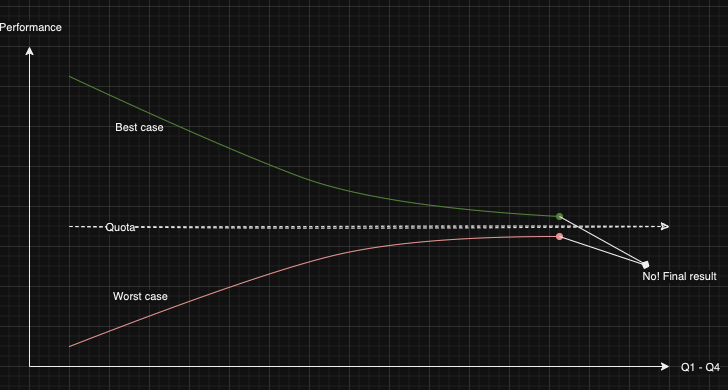learn to sell: b2b sales lessons from microsoft

I haven't written for more than two months now, which means that I broke a "contract" with myself of writing and publishing something at least once every week. It has been weird time for me overall, but regardless let's see if I return to good cadence.
Back to the topic of this post.
In the previous post I talked about how and why I started my career in tech sales. To continue that topic, I will be sharing few B2B sales lessons I learned during this period.

so, b2b sales: why should you care?
I noticed that many engineers and many people overall don't recognize how much of the importance the great sales organization has on the business.
Right now I am in the bubble of product people. By product I mean engineers, product managers, data scientists, designers. We care a lot about technical aspects of the product, such as what are the latencies, what is the UX, if the feature works, etc.
This is all great, but if you are a product person and I ask you what is the best product, Microsoft Teams or Slack, you would probably say Slack. And you will be right. However, Microsoft Teams eats Slack for breakfast in terms of growth, revenue, and usage. Why is that?
Beyond integrations and bundling of services in Microsoft ecosystem, one reason, I believe, is that Microsoft has much better sales organization or in particular they know how to speak to businesses of all sorts.
So at the end of the day, regardless of what cool features you have built, if you are in Business-to-Business (B2B, sells to businesses), you need great Go-To-Market organization in your company to market efficiently these features. And that is not easy. Just as a learning experiment, if you are a product person, try to contact a random company and convince them at least to give you 30 minutes for a presentation (I am not even talking about convincing them to give you money).
It is a very complex process: all companies are unique, even if the problem they have seems the same. Selling to a small company of 100 employees is not the same as selling to a company of 500 employees and definitely not the same as selling to a company of 10,000 employees. I find it interesting that at Capchase we started to hire sales people just for "enterprise" segment and that there are a lot of learnings about how different "enterprise" is to "small-medium". To me it seemed kind of obvious.
Below are learnings of mine from selling in "enterprise" (organizations with tens of thousands of employees), as this is where I worked. "Small-medium" businesses in Microsoft sales org don't receive that level of attention as deals are much more smaller and sales are usually much easier.
lesson #1: four numbers to know
There are four numbers that every seller must know:
- Quota (I must)
- Worst case (I'm sure)
- Forecast (I hope)
- Best case (I pray)
These four numbers will change over time from Q1 to Q4.
In Q1 when you just start the fiscal year the best case is basically your top of funnel. You come up with crazy amount of ideas and sales leads / opportunities at early stage of $X value. This $X must be several order bigger than your Quota (amount of money you must bring by EOQ/H1/EOY), because some of them you obviously won't be able to close. As time passes by, your best case will naturally go down as you won't have enough time to find new opportunities that will replace closed failed deals.
The worse case at the beginning represents low confidence in the quality of leads and early stage of the deals. As time passes by, you work on opportunities, develop the deals and gain more confidence to forecast better. Your worst case should increase.
Both the best case and worst case should eventually converge and be closer to the forecast. The forecast should be closer to your Quota. Ideally above it, if you aspire to be overachiever and get nice sales bonus. At Microsoft, if I remember correctly, achieving at least 70% was considered to be ok enough for you to continue the following fiscal year. Less of that, I believe, required some sort of explanation which should include forces out of the control, such as "devaluation of currency" or "oil prices dropped by 50%" that would affect all your customers.
Sometimes you were asked to provide a closing plan as a proof that the forecast is credible.
The worst situation is your numbers on a 2D plot reminds a supersonic airliner 'Concorde', where at the end everything collapses and you ended up below your worst case number, a number that by definition is what you have been promising.

lesson #2: value selling is key
First, what is value selling?
It is basically when you increase the perceived value of a product or service in the eyes of a customer, so that its price seems like a bargain.
Imagine you want to sell a car. How much should you ask for it?
If you are manufacturer of the car, then your price should at least cover the cost of producing it, marketing, delivering it and then have some profit margin. So essentially the value that you assign to the car is driven by the costs to produce it and the buyer might see it the same way and agree with you.
However, there could be another manufacturer who has better cost structure and therefore can price it lower for his car with similar features. The value of your car then is driven by pure demand-supply dynamics, regardless of your cost. Tesla at early stage might have spent $500,000 on producing single car due to low economy of scale and low efficiencies at the start, but still had to sell it on market price to stay competitive. The buyer might see both your car and your competitor's cars similar in terms of value to him.
However, imagine you have Shelby 1961 or Aston Martin DB9 used by James Blond on a movie set or a some other car that is produced in limited quantity. What is the value of your car? For a regular person your DB9 versus another one is of the same value – the engine, wheels, interior, performance are all the same. But for James Bond fan, your DB9 has much more value than other DB9s.
The value selling is to show that your product or solution has a value of 2500 for this specific buyer (for whatever reason), but then ask 200 for it, so that the Buyer will be happy paying you this 200 without mentioning the discounts.
If someone asks you discount, it means you haven't done value selling.
lesson #3: follow b2b sales framework
The framework is simple:
- Numbers
- you must know the budget
- how much the competitor charges
- how much your solution might cost
- Need
- You must find a need, so that you can do "value selling"
- Solution
- You need to define the solution that fills the need within the budget
- Decision Making Chain and Compelling Event
- Identify clear decision making chain
- Identify a trigger / compelling event to buy by the day X
- If there is no trigger or compelling event, make it up!
- Criteria for making decision
- If there is no Criteria, help customer make one!
- Administrator
- Is a person who signs the contract, might not be the user of your solution
- Identify this person and make sure she is not a blocker for your solution
- Champion
- Is a person who supports you (for whatever reason) AND has access to budget
- To determine Champion, ask her about decision making chain and if she doesn't know, she is not a champion
In this framework, the minimal requirements for closing the deal are compelling event and champion. In enterprise where the default would be to do nothing and have everything as-is you need to have an "urgency" and someone within the organization that will convey this "urgency" 24/7.
what is next?
I hope this post was useful, feel free to subscribe and leave comments..
Meanwhile, this would be the last post about my experience in B2B Sales for some time. Next few posts will be about data science.




